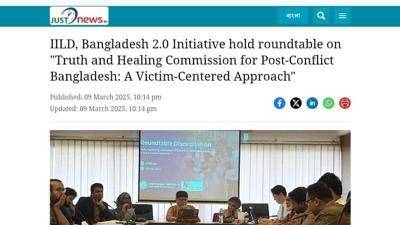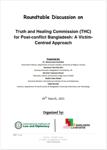
International Institute of Law and Diplomacy (IILD) and Bangladesh 2.0 Initiative hosted a roundtable discussion titled "Truth and Healing Commission (THC) for Post-Conflict Bangladesh: A Victim-Centered Approach" at the Dr. Abdullah Faruq Conference Hall, Faculty of Business Studies, University of Dhaka.
The event brought forward key stakeholders including academicians, politicians, activists, and other civil society actors to envision the prospect of a Truth and Healing Commission to address post-conflict grievances in Bangladesh.
The roundtable discussion was attended by peace researcher and conflict resolution practitioner, Professor Tatsushi Arai from Kent State University, USA; renowned photojournalist and activist Shahidul Alam; Huma Khan, Senior Human Rights Advisor at the United Nations Resident Coordinator’s Office in Bangladesh; Hummam Quader Chowdhury, a leader of the Bangladesh Nationalist Party (BNP); and other notable figures. The session was moderated by Barrister Tajriyaan Akram Hussain, an advocate of District and Sessions Judge Court in Dhaka.
Professor Tatsushi Arai, delivered the keynote address explored tranisitional justice concepts such as truth and healing. In light of his 25 years of international experience in conflict resolution initiatives, he offered practical recommendations for establishing the proposed commission grounded in the unique contextual elements of the country.
Activist Shahidul Alam emphasized the need for national dialogue to ensure justice for victims. He underscored the importance of creating a structured framework to bring victims' stories to light and address their demands for justice.
Huma Khan highlighted that while the July uprising led to partial changes in the government, institutions such as the police and judiciary remain largely unchanged. She raised concerns about ensuring the safety of victims in such a context and pointed out that oppression in the region extends far beyond the last 16 years, encompassing long-standing political and historical injustices across South Asia.
Barrister Imran Abdullah stressed the need for implementing healing measures such as a public apology and suggested setting realistic expectations for post-conflict Bangladesh where prosecuting every perpetrator is not possible.
Hummam Quader Chowdhury shared his personal experiences of solitary confinement in Aynaghor and underscored the necessity of establishing a Truth and Healing Commission to address these systemic injustices.
The roundtable also featured Ali Ahsan Zonaed, a key leader and activist of the July uprising, who recounted his harrowing experiences during the movement in Jatrabari. Other participants included Md. Ataur Rahman Talukdar, Assistant Professor at Bangladesh University of Professionals; Khandaker Raquib, Senior Researcher at the International Crimes Tribunal; journalist Sakib Sarkar; Omar Nasif Abdullah, Lecturer at North-South University; and Zahidul Islam Miaji.
Following the roundtable discussion, a working committee was formed under the proposal of Shafiul Alam Shahin, Executive Director of IILD, to advance the Truth and Healing Commission initiative. The committee members include Dr. Muhammad Asadullah, Saifuddin Ahmed, Md. Ataur Rahman Talukdar, Ali Ahsan Zonaed, Sakib Sarkar, Harun-or-Rashid, Barrister Tajriyaan Akram Hussain, Nousheen Sharmila Ritu, Shafiul Alam Shahin, Zahidul Islam Miaji and Rajib Mondal.





Leave a reply